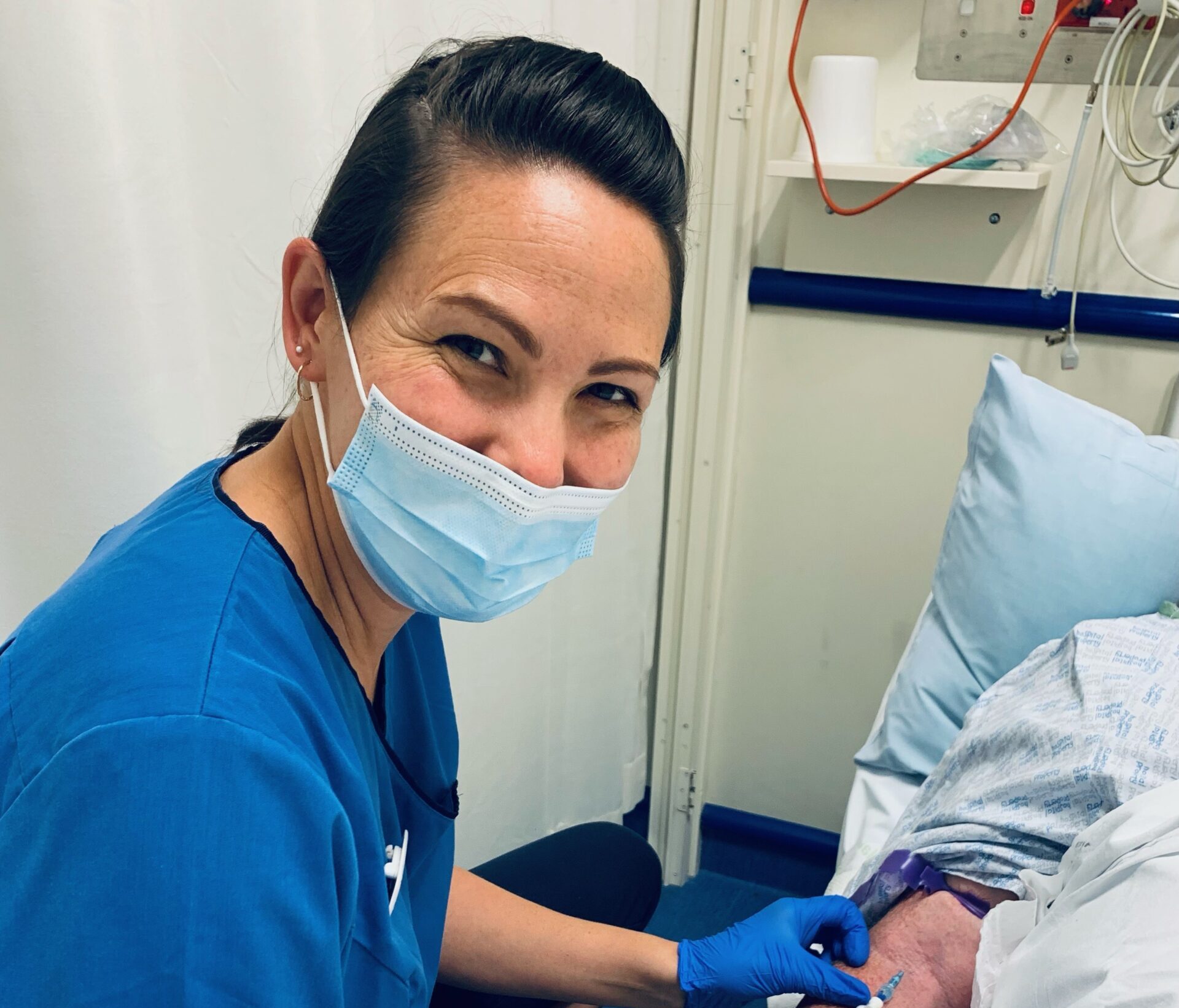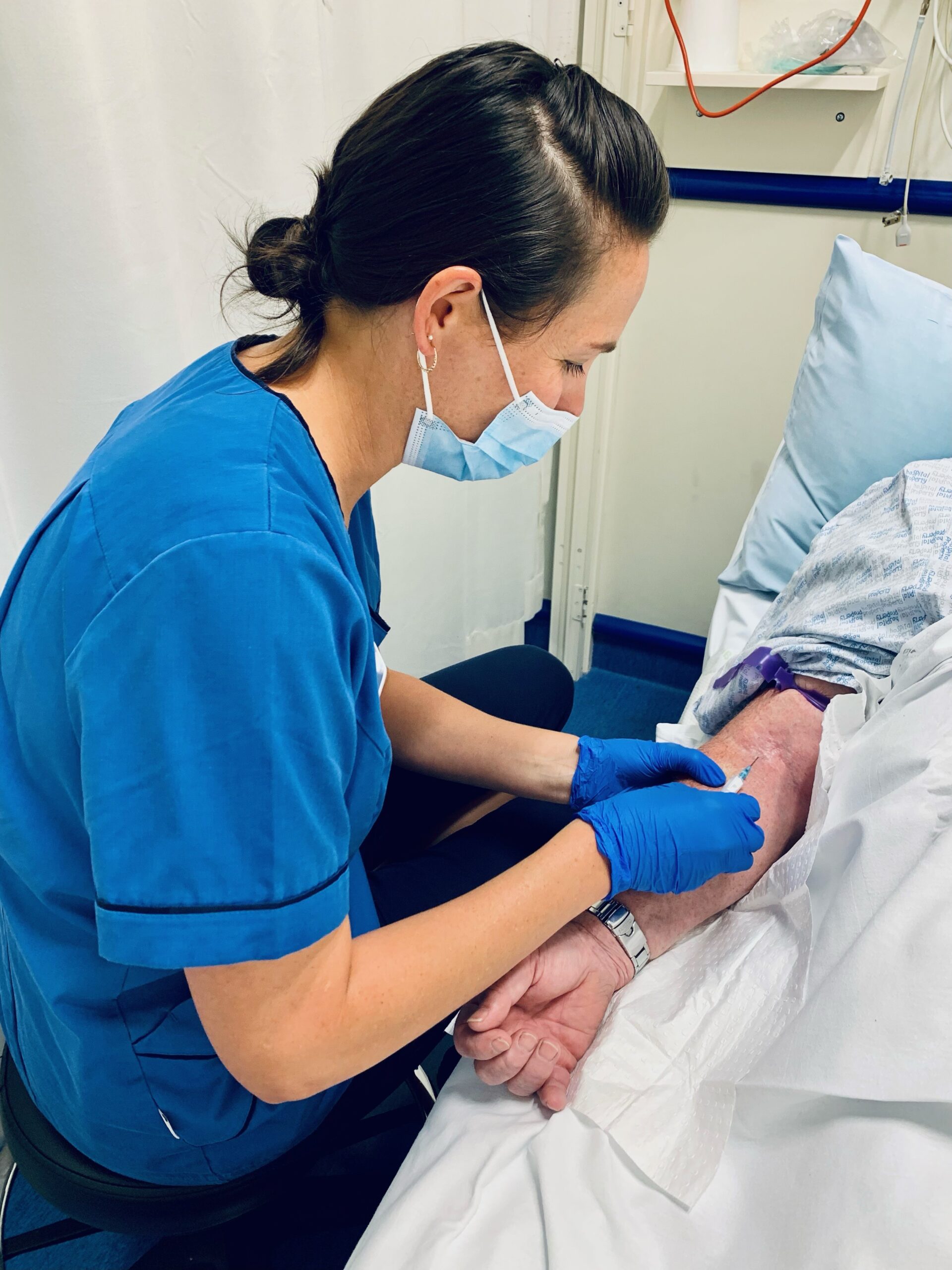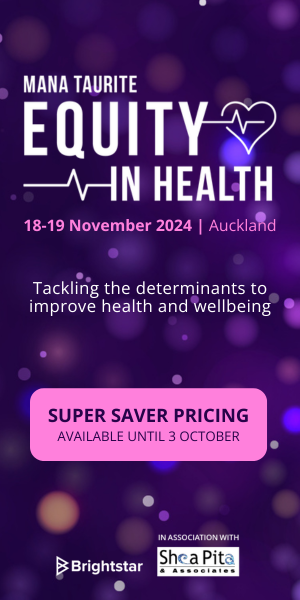
My name is Amy. I am a nurse. Sometimes I cause people pain.
My hand brushes against thick folded paper in the pocket of my crisp, neatly laid-out nursing uniform this morning. Quizzically pulling it out, my heart sinks as I remember.
Last Monday I agreed to become accredited in venipuncture. I have read the handbook and completed the quiz. I have practised inserting a cannula into a squishy blue plastic vein in a very realistic-feeling fake arm. This form commits me to complete four successful cannulations into poor unsuspecting humans over the next two months. I’ve been instructed not to tell my patients it is my first time.
How have I practised as a registered nurse (RN) for almost 17 years without ever inserting a needle into someone’s veins?
Well, no one ever asked me directly. Until now. Nurses in my unit are now being encouraged to cannulate patients pre-procedure — a role previously carried out mostly by doctors. My complete fear and aversion to causing someone pain is slowing down our unit and letting my team down. It is time. God help me.
The humiliation is overwhelming. The whole room is staring at me. I am exposed as the fraud I am.
So. Here we are.
I nervously approach patient zero, my guts churning, my heart racing. I am conscious of my capabilities, I am careful. I lean heavily on my mentor’s guidance and we have success. My confidence grows with this win.
I have begun. I’ve made the first step on this journey.
I complete my sign-off sheet in one week, feeling a little smug that each patient only took one attempt. Maybe I am a rock star after all. I am now accredited in venipuncture. I feel bona fide now — no mentor watching over me means the patients will never know how completely inexperienced I am.
Then I miss.
The humiliation is overwhelming. The whole room is staring at me. I am exposed as the fraud I am. I know I am permitted to try up to three insertions per patient, but I won’t. I will not attempt to cannulate anyone else in this room who has witnessed my failure. I cannot stand to feel they were all judging me, holding their breaths . . . hoping I don’t come near them with my wee kidney dish of supplies.
How have I practised as a registered nurse for almost 17 years without ever inserting a needle into someone’s veins?
I am fallible. I get it wrong and don’t actually know why, or even how, to “get it right”.
I am dejected. Maybe I can’t do this.
I make a deal with my highly-disciplined self to try once, every shift. I have some success but experience the same pattern of humiliation and waiting for the room to clear of all witnesses when I miss.
Others who started their IV cannulation journey at the same time as me seem to be having more success. I subtly watch their techniques and pore over my resources to try and work out what I am doing wrong.
A patient presents with amazing veins. These suckers don’t even need a tourniquet . . . I’ve got this — too easy!
Fail.
To remove a cannula from an artery, you hold firm pressure for five minutes. I hold for 10. He is very understanding.
I am now convinced I have no idea what I am doing.
I am nervous about going to work these days. Knowing I will be expected to cannulate haunts me. I often feel anxious.
Exasperated, I announce to my team that I just can’t do it and that I am giving up. My colleagues respond sympathetically.
I decide to attend another training session to watch and listen — again.
My confidence plummets further as I set out to cannulate the next patient, and a colleague gently advises that I’d better not attempt this one in case it wrecks the patient’s only good vein. She has a valid point. It still stings.
I’m told: “You just need to get your confidence back up.”
I’m feeling great — I even try a vein I hadn’t tried before. Five out of five in one day. I am pumped.
We run out of the cannulas I am familiar with. I try once with the new kind, get flashbacks, and then it tissues — ends up in the surrounding tissue instead of the vein. I won’t be trying again until the other ones are back in stock.
I get one in! I don’t know how I did it — I’m now more confused than ever.
‘I fail 10 times in a row’
I speak to a few trusted others and discover they also have limited success. I am starting to surrender my worry about failure. I am slowly distancing my worth from how well I can cannulate. It’s comforting to share camaraderie with others in the same situation.
I have a breakthrough and muster the courage to try twice on the same person. I fail the second time too. My hands shake as I apologise for the millionth time. I feel ill, but I am ok. I even stay chatting to the man afterwards.
I fail 10 times in a row.
It’s quite likely that patients aren’t judging me on my precision at cannulating their veins. Even if they are, I don’t need to take that on. My job is to know my limits, do my best, practise safely, communicate authentically and care for the person in front of me.
I am actually going to give up — it is too much stress. Cannulation is just not my jam.
Someone gently suggests doing it another way, by lifting the vein, taking my time, being aware of the anatomy, going in with the needle further than feels comfortable or safe. I try their way. One — in. Two — in. Three — in. I’m feeling great — I even try a vein I hadn’t tried before. Five out of five in one day. I’m pumped.
I guess sometimes things just take a new approach. I am so grateful for my colleague. His well-timed tips made all the difference.
I feel brave enough to try inserting a cannula into a hand this time. It goes in, I feel elated. I move on to the next patient who jumps and screams as the needle touches her skin. I freeze and hand her on to someone more experienced.
I have a new trick. I avoid veins that look tricky so as to not break my winning streak. But I know I’m not learning anything new and I’m still not really sure what I’m doing right or wrong.
I accidentally cannulate an artery. I learn to be aware that if it’s pulsing, it’s an artery. To remove a cannula from an artery you hold firm pressure for five minutes. I hold for 10. He is very understanding.

I make two attempts on a guy with such thick skin it won’t go in. It dawns on me that it isn’t hurting someone that I hate, but more that I cannot bear having them think less of me. I feel exposed by that reality. I didn’t know I was quite so prideful.
I am beginning to understand the anatomy of a vein better now. I take a deep breath and manoeuvre the cannula instead of instantly giving up. My success rate skyrockets as I learn to patiently persist and troubleshoot.
Three months in, I receive my first compliment: “You’re really good at this, I didn’t even feel it.” Ahhhhh, I’ve arrived! I’m validated as a person. Argh, wait, my self-worth is not tied up in my abilities.
Six months in and sometimes I get them, sometimes I miss. I still feel nervous and would often rather not try. However, when I miss, I don’t feel the sting of humiliation quite so strongly.
I am coming to a place of acceptance. That I am not my cannulation record.
It’s quite likely that patients aren’t judging me on my precision at cannulating their veins. Even if they are, I don’t need to take that on. My job is to know my limits, do my best, practiSe safely, communicate authentically and care for the person in front of me.
A year on . . .
Today marks the one-year anniversary of my cannulation journey. I am fairly comfortable around veins now, although I still miss enough to keep me humble — we all do. But I have started to think of myself as moderately capable. Maybe that’s the reward for perseverance and practice.
I am thankful for the journey. Acquiring this new skill has uncovered some issues from my shadow self — fear of judgment (including my own) and fear of failure — but it has developed me as a nurse and for that I am grateful.
Amy Clark is a registered nurse in Christchurch.



